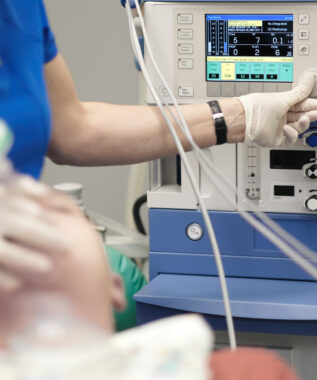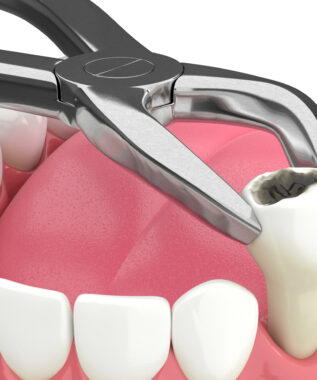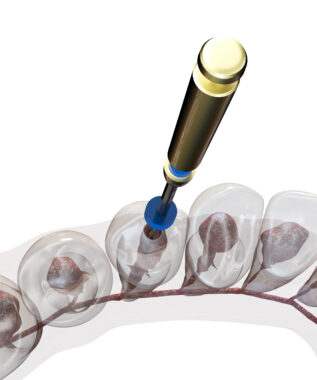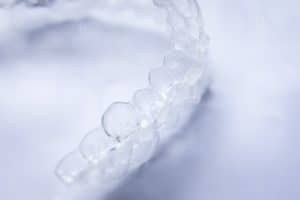 When your teeth aren’t aligned the way they’re meant to be, their misalignment can lead to several additional concerns that you might not think of right away. For example, their appearance may tell you that your teeth are crooked, but it’s the way they meet each other when you bite and chew that can have an even more significant impact on your immediate and long-term oral health. Today, we take a look at a few of these potential impacts, and why treatment with Invisalign® may be a good idea to help you avoid them. (more…)
When your teeth aren’t aligned the way they’re meant to be, their misalignment can lead to several additional concerns that you might not think of right away. For example, their appearance may tell you that your teeth are crooked, but it’s the way they meet each other when you bite and chew that can have an even more significant impact on your immediate and long-term oral health. Today, we take a look at a few of these potential impacts, and why treatment with Invisalign® may be a good idea to help you avoid them. (more…)
Have Your Wisdom Teeth Become Impacted?
Wisdom teeth, or third molars, are widely recognized. Unfortunately, that’s often because they’re frequently the source of significant problems, particularly when they become impacted before they can erupt properly. Though it isn’t always easy to know when wisdom teeth become impacted at first, the symptoms and consequences of it will become increasingly more noticeable as they continue trying to grow. Today, we look at a few things that might tell you your wisdom teeth are impacted, and why it’s important to consider extracting them as soon as possible. (more…)
Restoring a Tooth Before You Lose It
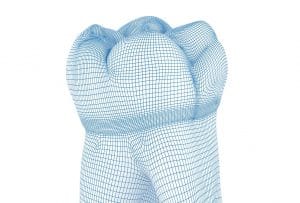 When your natural teeth become compromised in certain ways, the risks that the damage poses aren’t always obvious. For instance, you may not realize that a crack in your tooth could leave its inner tissues and nerves exposed to bacterial infection. Or, you may not suspect that the tooth may be lost or require extraction if the damage gets worse. The potential long-term risks to your tooth stem from the fact that a damaged tooth doesn’t repair itself. In order to save and preserve the tooth, your dentist will have to carefully examine it and help you choose the most appropriate restoration to stop the damage from getting worse. (more…)
When your natural teeth become compromised in certain ways, the risks that the damage poses aren’t always obvious. For instance, you may not realize that a crack in your tooth could leave its inner tissues and nerves exposed to bacterial infection. Or, you may not suspect that the tooth may be lost or require extraction if the damage gets worse. The potential long-term risks to your tooth stem from the fact that a damaged tooth doesn’t repair itself. In order to save and preserve the tooth, your dentist will have to carefully examine it and help you choose the most appropriate restoration to stop the damage from getting worse. (more…)
3 Things that Can Make Your Teeth Weaker
 Your teeth are healthiest when they’re strong, and they’re designed to maintain their strength and integrity in numerous ways. For example, the enamel that surrounds them is the most resilient substance your body produces, and when healthy, it can effectively protect your teeth from immense bite pressure, harmful oral bacteria, and more. Also, the alignment of your teeth makes them more efficient at absorbing your bite’s pressure without sustaining any damage. However, there are some factors that might weaken your teeth and their overall integrity, and today, we examine how a few of these factors can impact your oral health overall. (more…)
Your teeth are healthiest when they’re strong, and they’re designed to maintain their strength and integrity in numerous ways. For example, the enamel that surrounds them is the most resilient substance your body produces, and when healthy, it can effectively protect your teeth from immense bite pressure, harmful oral bacteria, and more. Also, the alignment of your teeth makes them more efficient at absorbing your bite’s pressure without sustaining any damage. However, there are some factors that might weaken your teeth and their overall integrity, and today, we examine how a few of these factors can impact your oral health overall. (more…)
Choosing Between a Dental Bridge and Dental Implant
 After losing a tooth, it’s important to consider the best solution for replacing it as soon as possible. Fortunately, many people can benefit from a healthier, fuller smile with the help of the right custom-designed tooth replacement. Traditionally, this meant a dental bridge that consists of a highly lifelike replacement tooth and one or two supportive dental crowns. However, for some patients, a dental implant may be a better solution for supporting their lifelike tooth replacement. (more…)
After losing a tooth, it’s important to consider the best solution for replacing it as soon as possible. Fortunately, many people can benefit from a healthier, fuller smile with the help of the right custom-designed tooth replacement. Traditionally, this meant a dental bridge that consists of a highly lifelike replacement tooth and one or two supportive dental crowns. However, for some patients, a dental implant may be a better solution for supporting their lifelike tooth replacement. (more…)
Reasons Why Your Teeth Might Become Damaged
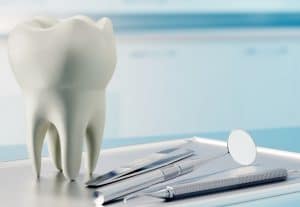 Some oral health concerns can have consequences that aren’t obvious at first. When these consequences do start to become noticeable, you may not realize that they’re the result of a condition you’ve experienced for a while now. In some cases, these consequences may include various levels of damage to your healthy, natural tooth structure. The cause and consequences of this damage can differ for everyone, and on the first steps to successfully restoring your smile could be identifying the specific reason why your tooth has become damaged. (more…)
Some oral health concerns can have consequences that aren’t obvious at first. When these consequences do start to become noticeable, you may not realize that they’re the result of a condition you’ve experienced for a while now. In some cases, these consequences may include various levels of damage to your healthy, natural tooth structure. The cause and consequences of this damage can differ for everyone, and on the first steps to successfully restoring your smile could be identifying the specific reason why your tooth has become damaged. (more…)
Tooth Extraction – The Last Resort for a Damaged Tooth
 When your teeth experience varying levels of damage, the right custom-designed restorative treatment can usually help you address the problem and preserve their health and integrity. The process of extracting the tooth isn’t typically an option, unless there is no other restorative treatment that can successfully save the tooth. Because of this, the recommendation to extract your tooth can have several important implications. On one hand, it means that your tooth is in serious trouble, and can threaten your oral health if it remains. On the other hand, it means you have a chance to mitigate this threat and restore your smile more effectively. (more…)
When your teeth experience varying levels of damage, the right custom-designed restorative treatment can usually help you address the problem and preserve their health and integrity. The process of extracting the tooth isn’t typically an option, unless there is no other restorative treatment that can successfully save the tooth. Because of this, the recommendation to extract your tooth can have several important implications. On one hand, it means that your tooth is in serious trouble, and can threaten your oral health if it remains. On the other hand, it means you have a chance to mitigate this threat and restore your smile more effectively. (more…)
The Kinds of Problems Teeth Develop from Bruxism
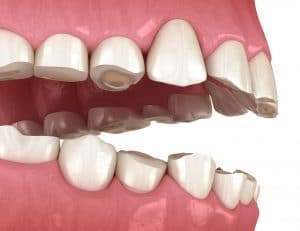 People who have a problem with bruxism, or chronic teeth-grinding, don’t always realize that it’s a problem at first. For example, most of them don’t realize just how often they grind their teeth together, and the times they do notice it, the action may not seem severe. However, having a bruxism problem means that you grind your teeth a lot more often than you realize. For many people, it occurs mostly at night, and the problems that can result from bruxism can become increasingly more detrimental to your immediate and long-term oral health. (more…)
People who have a problem with bruxism, or chronic teeth-grinding, don’t always realize that it’s a problem at first. For example, most of them don’t realize just how often they grind their teeth together, and the times they do notice it, the action may not seem severe. However, having a bruxism problem means that you grind your teeth a lot more often than you realize. For many people, it occurs mostly at night, and the problems that can result from bruxism can become increasingly more detrimental to your immediate and long-term oral health. (more…)
Important Questions About Tooth Loss
 Many people should be worried about tooth loss. In many cases, it results from the development and progression of another oral health concern, such as tooth decay or gum disease. If you’re worried about tooth loss, you may be more likely to take steps to prevent it from occurring. However, not everyone understands the risks that they face of losing one or more teeth, or how it would impact their smiles if they fail to prevent it. If they’ve already experienced tooth loss, it’s just as important to understand the best way to restore their smiles and regain their bite’s full function. (more…)
Many people should be worried about tooth loss. In many cases, it results from the development and progression of another oral health concern, such as tooth decay or gum disease. If you’re worried about tooth loss, you may be more likely to take steps to prevent it from occurring. However, not everyone understands the risks that they face of losing one or more teeth, or how it would impact their smiles if they fail to prevent it. If they’ve already experienced tooth loss, it’s just as important to understand the best way to restore their smiles and regain their bite’s full function. (more…)
3 Less Common, But Serious, Reasons for Teeth to Hurt
 When a tooth starts to hurt, many people can make an educated guess as to why. For instance, if your dentist has told you that you’re at risk for cavities, then you might guess that your tooth hurts because one has started to develop. However, not all toothaches are the same, and even if you might think you know why your tooth hurts, there may be one or more factors at play that you aren’t aware of. Today, we examine a few less common, but equally serious, reasons for teeth to hurt, and why you should schedule a professional dental examination as soon as yours start to. (more…)
When a tooth starts to hurt, many people can make an educated guess as to why. For instance, if your dentist has told you that you’re at risk for cavities, then you might guess that your tooth hurts because one has started to develop. However, not all toothaches are the same, and even if you might think you know why your tooth hurts, there may be one or more factors at play that you aren’t aware of. Today, we examine a few less common, but equally serious, reasons for teeth to hurt, and why you should schedule a professional dental examination as soon as yours start to. (more…)




